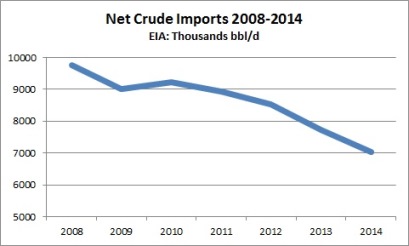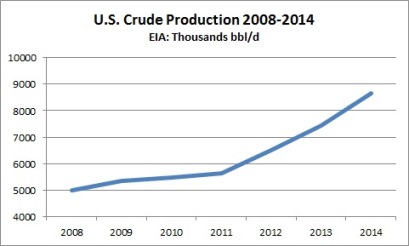Crude Imports Falling, Thanks to Domestic Output
Mark Green
Posted February 18, 2015
Falling crude oil imports is a good-news story for the United States – indicative of greater U.S. energy self-sufficiency, resulting in less dependency on others and increased American energy security in the world.
According to the U.S. Energy Information Administration (EIA), net imports of crude fell by more than 2.7 million barrels per day (bbl/d) from 2008 to 2014:

At the same time, domestic crude production has increased by more than 3.6 million bbl/d:

Easy to see: The increase in U.S. domestic crude production from 2008-2014 exceeds the decline in net crude imports over the same time period. The easy conclusion: The reduction in the amount of crude oil the U.S. is importing – strengthening both America’s energy security and overall security – results from growth in domestic production.
Simple, right? Not for everyone. Ethanol proponents often say that ethanol production gains are reducing crude imports. Uh, no. Not really. As we noted in a post last year, domestic oil production gains more than account for declining crude imports. Ethanol production has grown since 2008, but the increase of about 322,000 bbl/d (through October last year, the latest data available) is simply too small for proponents to claim that it is supplanting crude imports. The truth is growing ethanol production has virtually nothing to do with falling crude imports.
Here’s another way to look at it, an updated version of a chart from last year:
Again, crude imports (red bar) declined by more than 2.7 million bbl/d from 2008 to 2014. Domestic crude production (blue bar) grew by more than 3.6 million bbl/d over the same period. Growth in ethanol output (yellow bar) is an insignificant factor.
The year 2008 is important in this analysis because the Energy Independence and Security Act of 2007, which set the required ethanol-use volumes for the current Renewable Fuel Standard (RFS), was signed into law Dec. 19, 2007. The goal of the law was to spur the United States toward greater “energy independence and security” by reducing imports of crude oil.
That is indeed happening – but not because of the RFS.About The Author
Mark Green joined API after a career in newspaper journalism, including 16 years as national editorial writer for The Oklahoman in the paper’s Washington bureau. Previously, Mark was a reporter, copy editor and sports editor at an assortment of newspapers. He earned his journalism degree from the University of Oklahoma and master’s in journalism and public affairs from American University. He and his wife Pamela have two grown children and six grandchildren.



